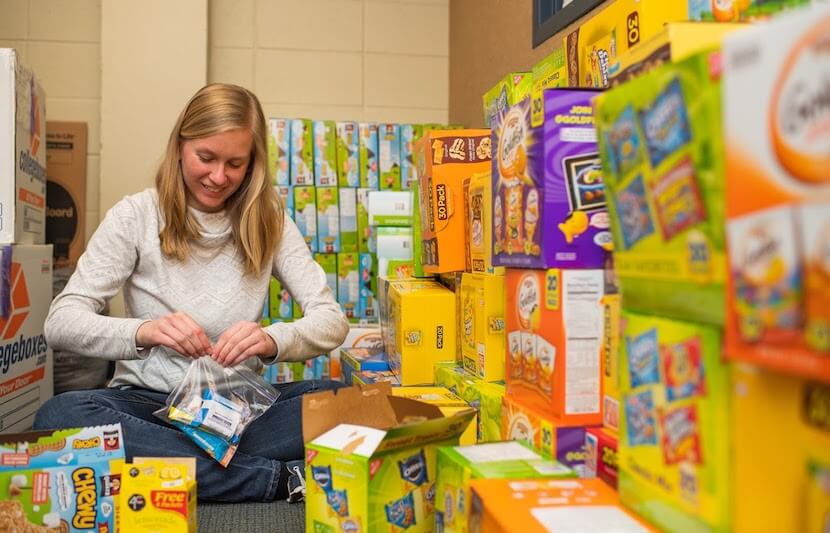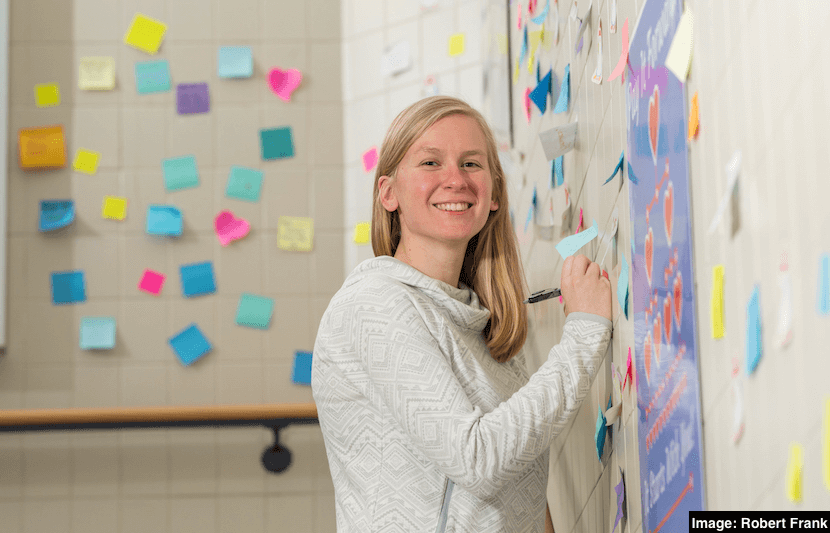4 a.m. Campus is dark. Everyone seems to be asleep. Almost everyone.
A group of students swiftly moves around different residence halls and commons, leaves hundreds of snack bags at each building, and quickly disappears from the scene.
Even Santa Claus can’t seem to match the students’ agility.
Next morning, pleasantly surprised with anonymous snack bags, students go into finals week, reminded that there are people out there who care about them.
“It’s like they don’t know who put that together, but they’re just so happy about it and you’re like, ‘hey I did that,’ ” said Ashlyn Kelly, 22, a recent graduate from Penn State Behrend and former president of a student-run club, aptly called Random Acts of Kindness (RAK), whose anonymous student members work to create a supportive campus environment.
Amidst the rising need for mental health services on college campuses, Kelly practices small, but daily acts of kindness, making sure no one goes to sleep feeling alone.
Then a receiver, now a giver
One of the top student tour guides on campus and a talented speaker who spoke in front of more than 400 people at a scholarship luncheon, Kelly seems anything but quiet or afraid.
But she wasn’t always like this. In fact, rewind the clock just four years back, and she was not only the quietest freshman on campus, as she described herself, but also deep in depression.
Starting in her freshman year, Kelly was harassed by her roommates. Halfway through her sophomore year, after an incident that involved the use of weapons by her roommates, Kelly was moved to another room.
In the beginning of the second semester, her father, an electrician, was severely burned on his face and multiple body parts while wiring a power box at a worksite.
In the second semester of her sophomore year, her grandmother passed away.
“It was a long two years. I would cry myself to sleep every night … so, my first two years weren’t the greatest,” said Kelly, sounding unbelievably relaxed.
In the beginning, except for some friends from church, with whom she met for weekly prayer meetings, none of her friends on campus knew the entire story.
“It’s not the easiest to talk about. But as time progressed, it does get easier,” said Kelly.
Yes, time helped.
But more specifically, small acts of kindness from family friends and neighbors convinced her that the only way to regain authority over depression was to pay what she received forward.
Especially after her father’s accident, people she barely knew came to help shovel snow out of her driveway and brought food to her family’s doorsteps.
“When someone you don’t even know does something for you that’s really nice and you don’t expect it, it has a deeper meaning. It shows that there are people out there that you don’t even know about that care about you,” said Kelly.
Random acts of kindness
By junior year, Kelly found herself at home in RAK’s supportive atmosphere.
During her two years as the club’s president, Kelly and her team of eight to 22 members, depending on the semester, worked on many projects aimed at creating a supportive campus culture.
“They do things very quietly,” Jill Forsman Fox, assistant director of residence life at Penn State Behrend and the club’s adviser, said in a statement.
“They try to stay behind the scenes, but the work they do really has changed the campus. That sense of belonging and the constant encouragement creates a positive energy, and when students feel that, they want to pay it forward.”
Kelly’s first project as the club’s president was creating a motivational wall.
The team first posted a giant piece of paper on a wall of a campus building and randomly wrote or drew motivational texts or images.
But, some students started drawing inappropriate pictures, which the members covered up with stickers. Eventually, they had to take it down because it was too hard to control.
Next semester, they put two banners up and covered them with sticky notes that said inspiring phrases. One banner said “take what you need” and another said “give what you can.”
The students really liked the banners. By the next semester, the team took the sticky notes to an entire stairwell, located right outside of the campus’ mental health counseling office.
In the hallway, they put a huge poster listing 10 to 12 hotline numbers for all different kinds of needs, such as suicide, sexual abuse, domestic violence and drug abuse.
However small a single sticky note may seemed, the need was greater than one could imagine.
Once, they put hotline numbers for suicide on about 10 sticky notes. Within a week, they were all gone.
Besides the motivational wall, RAK’s kindness projects include a weekly shoutout wall that congratulates certain campus groups for their achievements, anonymous online forms available for anyone to fill out when their loved ones need care, snack bags during welcome and finals week, and congratulations card tied to a roll of smarties to resemble a little diploma for every graduating senior.

RAK’s work cares for not only the students, but also faculty and staff.
One time, Kelly received an online form requesting a care package for a professor. She went shopping, filled the package with recommended items, and left it right outside the professor’s office.
“You don’t know what everybody is going through,” said Kelly. “When you go through the negatives in life, we all feel miserable and we want to get out of this lifestyle. But when you’re kind, you bring joy to people.”
Kelly is no longer the president, but she still helps out whenever she can.
Kindness is contagious
During spring break, Kelly and her friends witnessed how kindness speaks for itself.
Down in Texas, they were helping Hurricane Harvey Disaster Relief tear down victims’ broken houses to be remodeled afterwards.
A woman, whose house was being torn down, came up to them, unable to hide her emotions.
“The fact that a group of complete strangers from Pennsylvania flew all the way to Texas to help me, when I’ve gone months without any help, I just can’t get over it,” she told them.
The woman’s house was left untouched for eight months since the hurricane hit.
To Kelly, kindness always moves in two ways. It’s never just for other people, but also for the one practicing kindness, maybe even more so.
“When you see other people doing nice things for you, it makes you want to do nice things for others,” said Kelly.
When asked about a few ways people can start practicing kindness, Kelly’s answers were surprisingly simple.
Write 5 to 10 sticky notes with phrases to motivate yourself. Then, put them on somewhere on campus for others.
Treat a friend or a professor to an ice cream.
When leaving the campus parking lot, let someone go in front of you.
“Uh, trying to think what else,” said Kelly, pausing for a second. “I could go on all day with it.”



